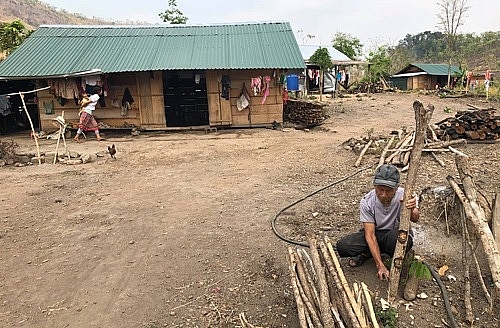Migrants dream of establishing village
 |
| Migrants build temporary houses on the isolated land. - Photo danviet.vn |
Their 18-month-old baby, Ly Thi Hoa, who had her hand burned by boiled water four days ago, is playing on the ground, and occasionally crying out in pain.
Xi said that he bought medicine for his young daughter.
“The pain will wear off after a few days. My house is too far from the hospital so I cannot take my daughter there,” he told Nong Thon Ngay Nay (Countryside Today) newspaper.
His house is one of thoses located in an isolated area in the middle of a forest in Ea Sup District in the Central Highlands province of Dak Lak, where there is an without electricity, clean water, schools or clinics.
The area is called Zone 286 of Cư M’Lan Commune, and is some 15km from Yok Don National Park.
The commune is home to more than 100 migrant families, with nearly 700 residents in total. They moved here to earn a living off of the forest.
About 500m from Xì’s family is 78-year-old Ly Seo Co’s house. The old man has been living in the Central Highlands region for 11 years.
Before migrating to Cư M’Lan District, he used to live with his children in M’drak Commune in Krông Pak District, about 160km from Cu M’Lan District.
Since settling down in the isolated commune, his grandchildren stopped going to school.
“They went to school when we lived in M’drak Commune. Now the closest school is 20km from my house. When they grow up, they will tend to the fields with their parents. When they get older, then they will get married. That’s all,” he said.
Fourteen-year-old Ly Thi Tra had to drop out of school before finishing grade 5, since she and her parents moved to the isolated area.
“Now I stay at home to take care of my younger sisters and brothers. I miss school,” she said.
Instead of going to school, all the children of more than 100 migrant families in Cu M’Lan Commune stay at home and do housework, or follow their parents to the fields.
Facing thieves
Running a small grocery store as a main source of living, Ly Seo Xi and his wife did not expect one day someone would break into their property and rob it.
“One day, my family went away for the whole day. When we came back, there was nothing left, even the chickens and dogs were gone,” he said.
His family did not dare to report the thief to the local authorities.
“We have to accept the loss, and we can do nothing because we are migrants and live here without permission from the local authorities.
“I had to take a loan of VND20 million (US$870,000) to buy new goods for my shop but do not know when I can pay back the loan,” he said.
Twenty-six-year-old Cu Vi Xa bought a new land lot covering 3ha in Cu M’Lan Commune. Shortly after a new house was built on the land, some strangers armed with weapons came and claimed the land lot’s ownership.
Xa did not do anything but took his wife and children to hide in the mountain area.
“We just moved in so we do not dare to fight with them,” he said, adding that two migrants died in Ea Bung Commune when they tried to react to land claimers’ aggressive actions.
Sung Xe Cho, 50 years old, a migrant from Yen Minh District of Ha Giang Province, said, “Our life is so simple that we only need water to drink and land to plant seeds.”
“We only want to live and earn some money from the land. We have become a community,” he said, adding that the migrants intend to tell more of their relatives to move to the land.
“We want to ask for local authorities’ permission to set up a village with a school and a community house,” he said.
According to Ea Sup District’s People’s Committee, the local authorities have mobilised sources to stabilise and improve the lives of migrant families. However, due to a limited budget, the projects have yet to have a meaningful effect on the daily lives of migrants.
While waiting for proper solutions from local authorities, the migrants will continue to live together in an isolated oasis.
What the stars mean:
★ Poor ★ ★ Promising ★★★ Good ★★★★ Very good ★★★★★ Exceptional
 Tag:
Tag:
Related Contents
Latest News
More News
- 14th National Party Congress wraps up with success (January 25, 2026 | 09:49)
- Congratulations from VFF Central Committee's int’l partners to 14th National Party Congress (January 25, 2026 | 09:46)
- List of newly-elected members of 14th Political Bureau announced (January 23, 2026 | 16:27)
- 14th Party Central Committee unanimously elects To Lam as General Secretary (January 23, 2026 | 16:22)
- List of members of 14th Party Central Committee announced (January 23, 2026 | 09:12)
- Highlights of fourth working day of 14th National Party Congress (January 23, 2026 | 09:06)
- Press provides timely, accurate coverage of 14th National Party Congress (January 22, 2026 | 09:49)
- Press release on second working day of 14th National Party Congress (January 22, 2026 | 09:19)
- Minister sets out key directions to promote intrinsic strength of Vietnamese culture (January 22, 2026 | 09:16)
- 14th National Party Congress: Renewed momentum for OVs to contribute to homeland (January 21, 2026 | 09:49)





















 Mobile Version
Mobile Version